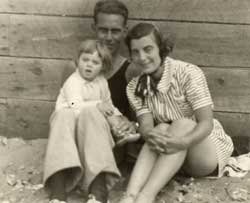 My mother, father and my sister, Janet, probably taken on Felixstowe beach in about 1934.
My mother, father and my sister, Janet, probably taken on Felixstowe beach in about 1934.We lived in the last house on the road out of town. The nearest child of my age lived half a mile away, and he went away to boarding school and came back in the holidays a nervous wreck, unwanted and unloved. I was the apple of my parents’ eye, an unexpected (unplanned) pleasure who’d arrived over ten years after my sister, except they had to spend most of their time looking in other directions. I went to school at 3½, a kindergarten attached to the local primary school so that my mother could spend more time with my sister.
Compared with many Downs Syndrome people Janet was severely handicapped. She could only utter few words, but was certainly able to make us all understand her wishes. When I was born she was ten years old but had only just started to walk unaided. Even so she usually insisted that she should be pushed in my pram, and I was either carried or made to walk.
Once we moved to Braiswick I was mobile and independent. It was a safe place for a child, with very few cars passing by the front of the house, and in any case I could play in the huge garden and the surrounding fields.
Beyond our field at the bottom of the garden the Colchester golf course provided me with plenty of fun. Golfers were always losing their balls on our land, and I’d creep from the bushes to collect the ball and watch as the frustrated players thrashed around in the undergrowth. I could never understand the attraction of knocking a little white ball around that course, especially as the players never seemed to take any notice of the beautiful world around. They strode on under the colony of rooks that lived in the high pines on the other side of the field adjoining our house, ignored the magnificent trees and always left the horse mushrooms for me to collect.
 Every morning the rooks set off across our house to spend their days feeding in the fields. They always seemed to fly west at the start of the day, perhaps keeping the sun out of their eyes? At dusk they came back, spending a few minutes checking our grassland for tasty morsels before noisily settling down for the night.
Every morning the rooks set off across our house to spend their days feeding in the fields. They always seemed to fly west at the start of the day, perhaps keeping the sun out of their eyes? At dusk they came back, spending a few minutes checking our grassland for tasty morsels before noisily settling down for the night.Those rooks were a firm part of my life, providing a clear example of the social structure of these birds and allowing me to realise that animals are far wiser than we recognise.
One poor bird also gave me a severe lesson. I was given an air rifle, a very weakly sprung .177 gun that had no real power. That Spring I stalked through the fields taking pot-shots at anything that moved. Fortunately I seemed to miss most birds, and was always conscious of the waste of life if I did kill one of these creatures.
One day that feeling was fully confirmed. I spotted a young rook sitting on the branch of a tree bordering our field. I took a shot at the bird, it did not move. I loaded and shot again, and again, and again. The bird still did not move. It was very young and probably on its very first flight from its nest, which was just across the five-acre field. Slowly a gash opened up in its neck as I continued to fire pellets at the poor creature. By this time I was in tears, as the bird looked at me, unstaring, as I tried to finish it off. My memory of the final act in this gruesome event is now lost, but I’m sure that I finally left the bird to fend for itself.
It taught me a lesson about the futility of killing for the sake of doing so, and I have little respect for those who hunt with guns, particularly those ‘sportsmen’ who shoot at pheasants, or other game birds, who have probably never flown in their lives until forced into the air by the beaters. Most game birds stay on the ground, only flying into the trees at night to roost. Such sportsmen deserve a good thrashing. There’s nothing wrong in killing for food, provided the animal has been given a good life, but shooting hapless birds for pleasure defies logic.
No comments:
Post a Comment